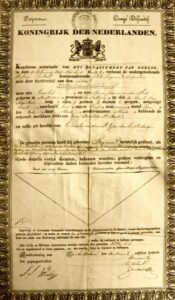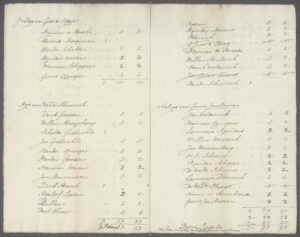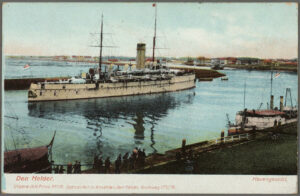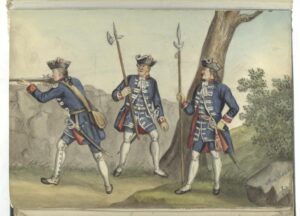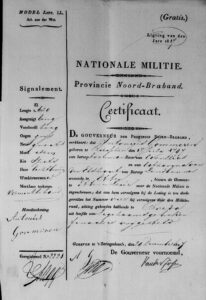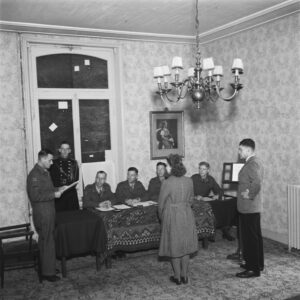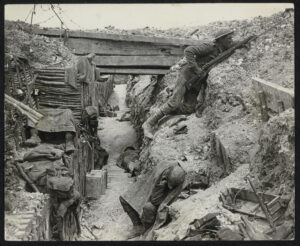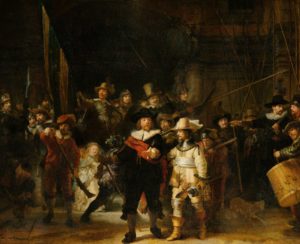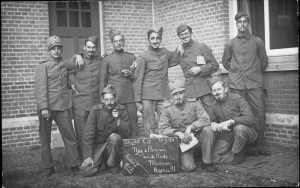A stamboek is a military service register. Outside genealogy, the word stamboek is also used for a studbook, a register of the pedigree of purebred animals. This usage has led several genealogy websites, including Ancestry, to mistranslate the stamboek military records as "studbooks." … [Read more...]
Dutch term – Gepasporteerd
Gepasporteerd (literally: passported) means a passport was issued. You will typically come across the term in military service records in the 1800s. At the end of service, a soldier received a passport to show he fulfilled his military duties. Since these passports were given to the soldiers, they may have survived in private collections but are unlikely to turn up in archives. See the reader question about military passports in the 1800s for an example. … [Read more...]
Dutch term – Inkwartiering
Inkwartiering means billeting, when soldiers were quartered in civilian houses. This could happen during times of occupation. Town records may have lists of houses where soldiers were billeted, including compensation for expenses. Knowing your ancestors had soldiers billeted at their house can be useful in different ways. Apart from being an interesting piece of biographical information, it places your ancestor in a specific time and place, which can help to determine when they died or moved, … [Read more...]
Dutch term – Marine
The marine is the navy. The Royal Navy of the Netherlands has been involved with protecting and expanding Dutch interests around the globe. In the 1800s and 1900s, the navy played an important role in maintaining order in the Dutch colonies, including the Dutch East Indies, the Netherlands Antilles, and Suriname. Navy records have partially been destroyed. The surviving records can be found at the National Archives. … [Read more...]
Researching Military Ancestors in the Netherlands – Before 1795
I often get questions about finding military ancestors, and thought I would write a few posts about that. I will start with the early period, before 1795. Before 1795, most soldiers were professional soldiers, not conscripts. The Dutch Republic (1588-1795) hired both Dutch and foreign men. Often, whole regiments were hired, including from Scotland, Switzerland, and Germany. The regiments would be stationed in garrison towns throughout the republic, changing every few years. Some soldiers … [Read more...]
Dutch term – Vrijstelling
A vrijstelling is an exemption. You may come across the term in military enlistment registers or marriage supplements, if a person was vrijgesteld [exempted] from military service. Example: Antonie Gommeren's military exemption When Antonie Gommeren married Adriana Timmermans in Etten-Leur on 27 January 1828, he had to prove he had fulfilled his military duties. He submitted a certificate of National Militia that included the text "uit hoofde van ligchaamsgebreken finaal vrijgesteld" [received … [Read more...]
Dutch term – Krijgsraad
Krijgsraad means "court martial." You may find a reference to a court martial in your ancestor's military records if they made severe transgressions. If the person was sentenced to a prison sentence, prison records may also refer to the court martial verdict. Court martial records are typically kept in the regional historical center in the provincial capital. … [Read more...]
Dutch term – Loopgraaf
A loopgraaf is a trench. They were most famously deployed in World War I, when the Netherlands was neutral, but also in other wars. … [Read more...]
Dutch term – Schutterij
The schutterij is the citizen militia responsible for the defense of the town. In times of war, they could be called up to defend the country. Schutterijen existed throughout the Netherlands from at least the 1500s. Regulations for the schutterijen were standardized in 1814. Male residents between the ages of 18 and 50 (from 1827: between 25 and 34) were elligible to serve. By law, 600 schutters were required per 20,000 residents. Schutterijen existed until 1901. Records for schutters can … [Read more...]
Dutch term – Broederdienst
Broederdienst literally means "brother service." It was a reason for exemption of military service. If a family had an even number of sons, half of them had to serve. If they had an uneven number of sons, the lesser half had to serve. The brothers who did not have to serve got an exemption for broederdienst. You will often find these exemptions listed in the marriage supplements. … [Read more...]

